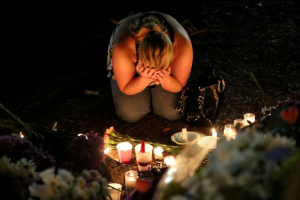The gunman who slaughtered 49 people at a gay nightclub in Florida threatened to blow up a car rigged with bombs and to strap hostages into explosive vests, according to partial transcripts of his 911 calls released on Monday.
The FBI published the heavily redacted text of Omar Mateen's phone conversations with a dispatcher and crisis negotiators and sought to fend off criticism that police may have acted too slowly to end a three-hour standoff at the Pulse nightclub in Orlando, the worst mass shooting in modern U.S. history.
"You people are gonna get it, and I'm gonna ignite it if they try to do anything stupid," Mateensaid during one of the calls made from Pulse, according to the FBI transcript.
"While the killer made these murderous statements, he did so in a chilling, calm and deliberate manner," Ron Hopper, a FBI assistant special agent in charge, said at a new conference.
Mateen also said in his calls that he was wearing an explosive vest like the kind "used in France," apparently referring to the deadly assault in Paris last November by Islamic militants, according to the transcript.
As patrons fled the club, they told police outside that the shooter said he was going to put four vests with bombs on victims within 15 minutes, the FBI said in its statement.
No explosive vests or bombs were found in the nightclub or the suspect's car, however, the FBI said.
Mateen, 29, a U.S. citizen of Afghan descent who was working as a security guard, likely was "self-radicalized," federal agents have said.
Mateen identified himself as an "Islamic soldier," according to the FBI transcript, and he told a negotiator to tell the United States to stop bombing Syria and Iraq.
The transcript did not include a pledge of loyalty that authorities say he made to Islamic State's leader. Hopper said that only a partial transcript was released so as not to "propagate violent rhetoric."
U.S. House of Representatives Speaker Paul Ryan called for the full text of the calls to be released and accused the Obama administration of censoring references to the Islamic State militant group. He said the decision to edit the transcript was "preposterous" and that everyone knew Mateen was a radical Islamic extremist inspired by Islamic State.
"We also know he intentionally targeted the LGBT community," the top elected Republican official said. "The administration should release the full, unredacted transcript so the public is clear-eyed about who did this and why."
GUN CONTROL LEGISLATION
The Pulse attack renewed discussion on gun control in the United States. The U.S. Senate was set to vote on Monday on four competing measures - two from Democrats and two from Republicans - to expand background checks on gun buyers and curb gun sales for people on terrorism watch lists.
None of the bills were expected to achieve the 60 votes needed for passage in the 100-seat chamber, as Republicans and Democrats have not been able to reach consensus.
The Joint Terrorism Taskforce has conducted more than 500 interviews about the June 12 massacre, Hopper said, and has processed more than 600 pieces of evidence.
Orlando Police Chief John Mina said the initial engagement by authorities caused the gunman to retreat and barricade himself in a bathroom with hostages. He said officers were inside the club saving victims during the standoff.
"I am very confident that they saved many, many, many lives that night," Mina said, rejecting any criticism that police had failed to act quickly enough to end the siege.
"Those killings are on the suspect and on the suspect alone," Mina told the news conference. "It was a very difficult decision but it was the right decision and I stand by it."
Authorities have said preliminary evidence indicates Mateen was a mentally disturbed individual who acted alone and without direction from outside networks.
The massacre, which also left 53 people wounded, has led to soul-searching over easy access to firearms in the United States and the vulnerability to hate crimes of people in the gay, lesbian, bisexual and transgender community.

















